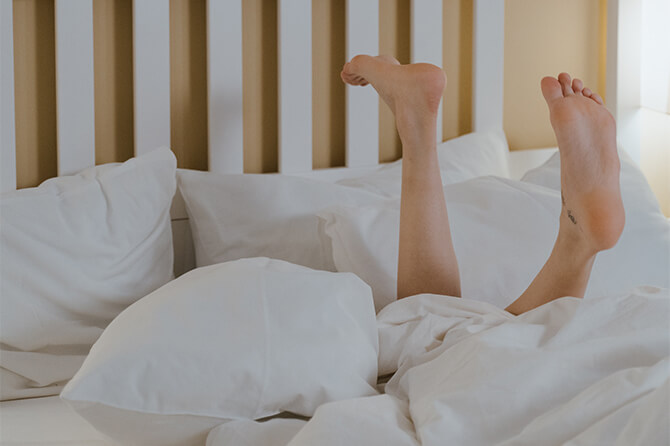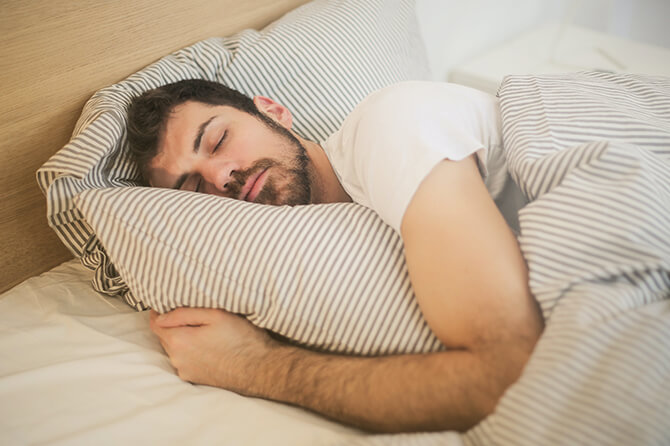![5 Common Sleep Problems [And How to Treat Them]](https://www.dormeo.co.uk/media/wysiwyg/blog/On-phone-in-bed.jpg)
5 Common Sleep Problems [And How to Treat Them]
Trouble sleeping? With 36% of UK adults experiencing difficulty sleeping at least once a week, just know you’re not alone. We've got some suggestions to help you understand and treat five of the most common problems.
You read that right; upwards of a quarter of the UK population regularly struggle to snooze. And that’s without mentioning the snowball effect. (FYI: our phrasing, not an official term.)
You see, if addressed early, sleep problems can – and often do – improve without the need for medical intervention, so it’s important to investigate and tackle any difficulty sleeping you’re having before it worsens.
Note: While some sleep problems can be addressed without visiting your doctor, it’s important to book an appointment if the problem persists as it could indicate a more serious issue.
Identifying and Treating Common Sleep Problems
Some sleep problems are obvious. (Looking at you, snoring). Others, however, are more insidious, making them difficult to identify.
Ask yourself: how often have you shrugged off intense fatigue as just a ‘rough night’? Or chalked irritability and difficulty concentrating to work-related stress? Thought so.
We spend almost a third of our lives in dreamland. And even though we’re starting to pay closer attention to our sleep, often using smartwatches and mobile apps, we’re guilty of simply dismissing what these devices (not to mention our bodies) are telling us. Signs of sleep problems include:
- Fatigue
- Difficulty concentrating
- Mood swings
- Memory loss
- Weight gain
- Unexplained changes to your sleep/wake pattern
- Unusual movement (often jerky) whilst falling asleep
By ignoring changes to your sleep – especially those with no apparent rhyme or reason – you risk creating the ideal environment for sleep problems to develop. You know when doctors always ask you how you’ve been sleeping? That’s why.
It’s vital that you get enough sleep. Aside from being essential to your physical wellbeing, snagging the proper amount of shut eye plays a key role in your emotional wellbeing.
So, as you can imagine, identifying and addressing sleep problems is hugely important. But given the overlap between symptoms, it can be difficult to assign them to specific sleep problems.
Difficult, but not impossible. Let’s investigate.
1. Insomnia
You’re probably already familiar with insomnia. It’s featured in TV shows, plagued the protagonists of countless novels, and even formed the basis for video games.
But as is often the case when sleep problems feature in popular culture, it’s frequently misunderstood. Or worse, ignored. So, what is insomnia?
Insomnia is the umbrella term used to refer to recurrent difficulty falling or staying asleep. If you suffer from insomnia, you may experience extreme fatigue or cognitive impairments during the day.
Insomnia is most often caused by stress, excessive noise, jetlag, and even shift work can trigger the condition. It can also be linked to pre-menstrual stress and surgical procedures.
Whatever the cause, insomnia can severely impact your wellbeing. So, what can you do about it?
If you’re struggling with insomnia, it’s best to avoid napping during the day. Why? Well, naps can be highly disruptive to sleep – especially if taken too late in the day. By resisting the urge to snooze on the couch, you’ll boost your chances of getting natural sleep at bedtime.
Exercise has also been proven to combat insomnia, as well as improve overall sleep quality. Whether it’s a brisk morning jog, some light weights, or even yoga, regular exercise can reduce the severity of insomnia.
Finally, you can tackle insomnia by cultivating the best sleep environment possible. And that’s much easier than it sounds. For example:
- Maintain a steady temperature – not too hot, not too cool. A simple way to achieve this is by reviewing your bed set up. Is your mattress allowing air to circulate properly? Have you got a breathable duvet? Is your pillow cool enough?
- Minimise noise
- No electronics before bed
- The right mattress for your sleep style

Insomnia can have a staggering impact on your wellbeing, so it’s important to consult your doctor if making changes to your sleep environment doesn’t help.
2. Snoring
Snoring is many things. Disruptive. Irritating. Even harmful to your - or your partner’s - health. Even so, it’s frequently dismissed as something to just ‘power through’ rather than being recognised and treated as the bonafide sleep problem that it is.
But what causes snoring? And how can it be dealt with?
Snoring happens when air passes over relaxed tissues including your tongue, throat, mouth, or nasal airways. As these tissues relax when you sleep, they vibrate as air passes over them – resulting in a bass-y rattle.
While everyone snores a little, the severity of the snore can depend on several factors, including:
- Weight
- Sleeping position (snoring can be worse for back-sleepers)
- Alcohol consumption
- Smoking
Fortunately, the lack of a universal trigger for snoring means there are various treatment options - each specific to the reason for your snoring. For example, you might try tweaking your sleeping position; especially if you’re a back-sleeper. By doing so, you’ll allow the soft tissue to settle into a different area, allowing air more space to flow.
If you’re fond of a nightcap, it may be worth considering when you partake in your favourite tipple as alcohol causes the muscles at the back of the throat to close much faster, hugely increasing your risk of snoring. (And feeling that kick in the shins from your partner.)
You might also try opening your nasal passages. (Don’t worry, it’s easier than it sounds!) The best method? A hot shower before bed. You could also use a neti pot to rinse your nose out, thereby opening your nasal passages.
Other treatments for snoring include losing weight, quitting smoking, and investing in nasal strips or dilators.
Remember: what triggers your snoring will likely be specific to you, so take a moment to consider what might be causing you to snore. If needs be, use the process of elimination until you see improvement.
3. Sleep Apnoea
Sleep apnoea, defined as the stopping and starting of breathing, is a serious sleep disorder. Along with extreme fatigue, it can increase your risk of heart trouble and high blood pressure.
While symptoms overlap, snoring and sleep apnoea are by no means the same. For example, snoring linked to sleep apnoea tends to be much louder, causing greater disruption to your sleep.
And, more worryingly, sleep apnoea is often typified by long pauses in your breathing – sometimes up to 10 seconds. In turn, this can lead to restlessness and even choking.
As such, it’s important to take steps to treat sleep apnoea as soon as you recognise the symptoms, which include:
- Making gasping, snorting, or choking noises in your sleep
- Snoring
- Pauses in your breathing (of 10 seconds or longer)
- Fatigue
- Mood swings
If you experience symptoms of sleep apnoea, it’s important to speak to your doctor, who’ll determine whether any medical intervention is necessary. (But this isn’t always the case).
It’s also possible to take steps to minimise or alleviate the effects of sleep apnoea with changes to your lifestyle and sleeping habits.
For example, as with snoring, sleep apnoea can be triggered by sleeping on your back, so you may wish to switch to sleeping on your side, instead. If that doesn’t work, you can also try using a humidifier in your bedroom as this will reduce dryness in the room – which has been known to worsen symptoms of sleep apnoea.
Some people have also reported that certain mouth exercises reduced the severity of their apnoea. These may be simple breathing exercises or stretches focused on the tongue and lips.
Much like snoring, some lifestyle changes have been known to address sleep apnoea. For example, quitting smoking, moderating the amount of alcohol you consume, and getting regular exercise.
4. Restless Leg Syndrome
Affecting approximately 10% of adults in the UK, Restless Leg Syndrome (RLS) isn’t as common a sleep problem as other entries in this list, but that doesn’t make it any less frustrating or disruptive.
Restless Leg Syndrome is best described as a discomfort in the legs (often crawling or tingling sensations) that provokes an overwhelming urge to move the leg to relieve the discomfort.
Usually peaking at night, RLS symptoms vary from mild to severe, so it’s important to speak to your doctor if the discomfort becomes too much to treat at home.
However, if your symptoms are mild, they’ll often clear up if you observe good sleep hygiene, minimise caffeine late at night, and avoid alcohol in large quantities. You may also try sleeping with a pillow between your legs, as doing so will prevent the compression of nerves in your legs.

Other non-medical treatments include: sitting with your feet flat on the floor when you’re sitting at a table or desk, avoiding daytime naps, and staying as hydrated as possible during the day.
Restless Leg Syndrome has also been linked to iron deficiency, meaning it’s possible to treat with iron supplements. (You can speak to your doctor to book a test.)
It’s worth noting that while RLS is a sleep problem most commonly affecting the legs, symptoms can also be present in the arms, head, and torso, so it’s important to pay attention to any discomfort you may be feeling.
5. Jetlag
Jetlag is often dismissed as a lesser sleep problem, despite posing serious (if temporary) symptoms.
Jetlag occurs when you travel across time zones and is triggered by a temporary disruption to your circadian rhythm (your body’s built-in clock).
Symptoms typically include excessive sleepiness, headaches, stomach problems, and insomnia, but sometimes include concentration and memory problems (not ideal if you’re travelling for work).
While there’s no cure for jetlag (even if, like hangovers, everyone has a theory), there are steps you can take to lessen its effects. Such as:
- Staying hydrated before, during, and after your flight
- Adjusting to your new time zone as early as possible
- Get as much natural light as you can
- Don’t sleep in – you’ll make it worse!
If you’re struggling to tame jetlag, you may try herbal remedies or sleeping tablets, but it’s wise to speak with a doctor before doing so. Jetlag usually clears up in 1-3 days, depending on the time difference and duration of your flight.
Sleeping in general while travelling can be hard, so take a moment to discover more tips and tricks for sleeping better while travelling.

And there you have it: several non-medical solutions to sleep problems. If you’re eager to improve your sleep, check out our sleep blog for handy tips and explainers.





![5 Common Sleep Problems [And How to Treat Them]](https://www.dormeo.co.uk/media/wysiwyg/blog/Desktop-banners/Person-with-phone.jpg)



Leave a Reply